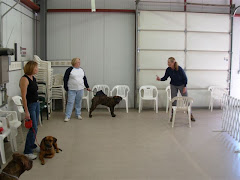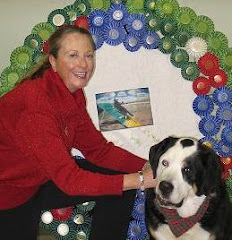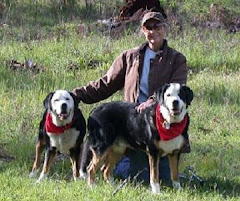 As many of you know, my husband and I have owned five Greater Swiss Mountain Dogs in the past dozen years. I've worked with about twice that many others in training classes and seminars. We've never shown them in conformation, and all our dogs are spayed and neutered. However, I've competed most of them in obedience and agility, back when there was precious little Swissy involvement in either of those venues. At that time, the Swissy was considered by its breeders to be difficult to train for AKC obedience trials, and unsuitable for the sport of agility.
As many of you know, my husband and I have owned five Greater Swiss Mountain Dogs in the past dozen years. I've worked with about twice that many others in training classes and seminars. We've never shown them in conformation, and all our dogs are spayed and neutered. However, I've competed most of them in obedience and agility, back when there was precious little Swissy involvement in either of those venues. At that time, the Swissy was considered by its breeders to be difficult to train for AKC obedience trials, and unsuitable for the sport of agility.My dogs helped prove them wrong. We set high bars for the rest of the Swissies to follow. My dogs, particularly Atlas, made history for the breed. Now, I'm happy to say, the Swissy is getting more credit for being an exceptionally intelligent, trainable and versatile dog.
But it's not a breed for everyone....
The Swissy is a striking dog. You can hardly walk your Swissy anywhere without people stopping to admire and inquire, "Is that a Burmese Mountain Dog?" So let's clear up some confusion. There are four "Swiss Mountain Dogs," all related. Two are AKC breeds: the Greater Swiss and the Bernese. (Note: it's BERNese, as in Bern, Switzerland, not Burma!) The other two Swiss Mountain Dogs--the Entlebucher and Appenzeller--are much smaller but similar in coloring.
The most popular of the four is the Bernese Mountain Dog. They're friendly and happy looking, and they're beautiful in their tri-colored long-haired coats. They're known as great family dogs, gentle with children.
The Greater Swiss is larger and taller than the Berner. The hair is much shorter. They are also more reactive and they bark more than the Berner.
Both breeds are built for draft work--pulling carts and wagons. They are true workhorses, and categorized in AKC's "working dog" group. Because they are "working dogs," it's imperative that they be employed at something. If they're not, they can be a handful. The Greater Swiss typically weights between 100 and 140 pounds. This is a totally NON-AGRESSIVE dog, but he can still jerk you around on a leash-walk if his manner are lacking.
Most people nowdays are attracted to the Swissy for its looks. But those who buy Swissies because they are attractive dogs have a lot to learn, and often doubt the wisdom of their purchase within a short time.
Here's a list of the good things about Swissies:
1. They're non-aggressive toward children and generally other people and dogs.
2. They are loyal and loving, and choose to stay close to their owners rather than roam.
3. They're easy to train for obedience, rally and agility.
4. They always smell good and need infrequent baths.
And now, the bad things:
1. Their life expectancy is only about 10 years.
2. They're expensive, and there's a waiting list.
3. They shed bushels of hair, all year long.
4. They bark loudly and often, and have NO "Off" switch or volume control.
5. They are reactive, often barking excitedly before they realize there's nothing to bark about.
Swissies are wonderful family dogs. They enjoy sleeping on couches and people beds, and they MUST NOT be isolated from their people. Despite the hair, this is NOT an "outside dog." They are wary of strangers and new circumstances. They're shy at first blush, but quickly warm up to any friendly stranger. They're generally loving and playful, and just a bit goofy. They require a moderate amount of sustained aerobic exercise (long brisk walks, rather than jogs), and they need a daily mind/body workout of some kind. Remember they are bred to pull wagons and heed commands related to this type of work.
This is a good dog to take hiking, especially since he can pack his own food in a backpack! It is not as good a dog to take running, since these guys are big and heavy, and their joints can wear out rather quickly with the wrong exercise. It's not a guard dog either, despite its size. The Swissy will bark to let you know something is amiss, but he's not going to attack anyone.
This is not a good "city dog," primarily because of its tendency to bark loudly and often, inside or out.
We have dearly loved our Swissies over the years. Although most Swissy owners find training a challenge, I found it simple to train these WORKING dogs, and almost all of mine did exceedingly well in obedience and agility competitions. Swissies are extremely sensitive and can get their feeling severely hurt quite easily. Most will shut down if this happens. On the other hand, since they're working dogs, they expect to be WORKED, not treated and cajoled like little cupcakes. Herein lies the training challenge with Swissies. Since they are pricey dogs (starting at $1100 for pet-quality), they are frequently purchased by well-off families who love the dog's looks and personality and spoil him rotten. They read about the Swissies' sensitivity and end up handling him with such kid gloves, so as not to hurt the dog's feelings, that the dog gets away with way too much. A 120-pound dog who's exuberantly out of control is not easy or pleasant to walk on a leash! And yet many Swissy owners accept this as a behavior they have to live with!
When Atlas and Kosmo, our last two Swissies, are gone, there will probably be no more Swissies for us. It's the hair, the barking, the goofiness. Atlas and Kosmo, at 12 and 11 respectively, are proving the value of good nutrition and active lives. Yet most Swissies never see an obedience or agility ring, and most, sadly, die of cancer or related illnesses before the age of 10.
If you're thinking of bringing one of these striking and lovable dogs into your family, do your research and be very honest with yourself about what you can comfortably tolerate. When you get a Swissy, you'll never want to part with him...but you don't want to be cussing that shedding and barking for the next 10 years either.


















No comments:
Post a Comment